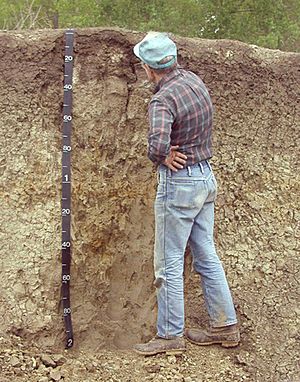Soil science facts for kids
Soil science is a cool field that studies soil. It looks at soil as a super important natural resource right on the Earth's surface. Think of it as the science of dirt!
Soil scientists learn how soil is made (this is called soil formation). They also learn how to group different soils together (this is called classification) and how to map where different soils are found.
Many other sciences also help us understand soil better. These include engineering, farming experts, chemistry, geology, geography, biology, microbiology, forest management, public health, archaeology (studying old things), and even regional planning.
When we talk about "soil," we mean everything from the very top layer of dirt down to the solid rock underneath, which is called "bedrock." Soil often has different layers, like a cake! The top layer is usually full of organic matter, like decaying plants. Below that, there might be a layer where rainwater has washed away some metals. These metals often collect in a lower layer. Finally, there's a layer mostly made of small pieces of the bedrock. Not all soils have every single layer, but many do.
Soils are super important for us. Most of the groundwater we use for drinking, cities, and farming is found in soil, not in the hard bedrock. So, healthy soil means healthy water!
What Soil Scientists Do
Soil science is used in many different areas. Here are some of the main ones:
- Soil surveys: Mapping and describing different types of soil.
- Soil management: Learning how to keep soil healthy and productive.
- Standard analysis: Using special methods to test what's in the soil.
- Soil fertility: Making sure plants get enough nutrients from the soil to grow well.
- Ecosystem studies: Looking at how soil fits into the bigger picture of nature.
- Climate change: Understanding how soil affects and is affected by changes in our climate.
- Water studies: Studying how water moves through watersheds and wetland areas.
- Pedotransfer functions: Using what we know about soil to predict how it will behave.
Other Sciences That Work With Soil
Many other fields of study work closely with soil science:
- Agricultural sciences: This includes things like managing irrigation (watering crops).
- Anthropology: This field studies humans and their history, often looking at layers of soil to find old artifacts.
- Environmental science: This looks at how we interact with our environment, including how different landscapes are connected.
- Geography: Especially physical geography, which studies Earth's natural features.
- Geology: The study of Earth's rocks and how they form.
- Hydrology: The study of water, including hydrogeology which focuses on groundwater.
- Waste management: How we deal with trash and its impact on soil.
- Wetland science: Studying areas where land is covered by water, like swamps and marshes.
Images for kids
-
Map of global soil regions from the USDA
See also
 In Spanish: Ciencia del suelo para niños
In Spanish: Ciencia del suelo para niños
 | George Robert Carruthers |
 | Patricia Bath |
 | Jan Ernst Matzeliger |
 | Alexander Miles |



